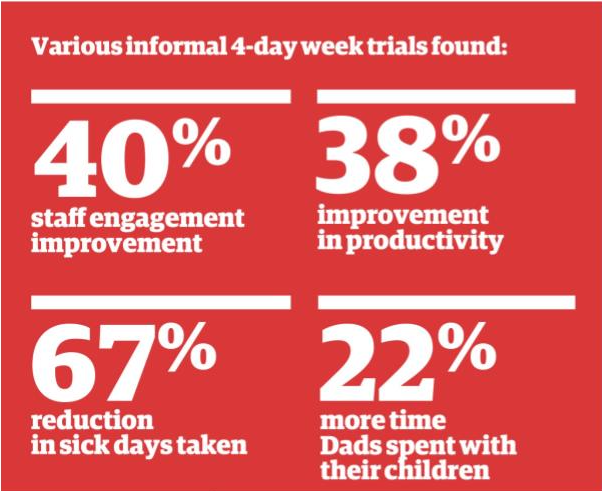
Is a four-day working week the future? Andrew Barnes (SE 1978), banker and entrepreneur turned campaigner, was behind the group that brought the idea to the forefront. Here, he reveals the personal motivation behind his mission to advocate a shorter working week.
One of my enduring memories as a 24-year-old junior executive in a UK merchant bank was watching my 50-year-old boss break down in tears in front of me due to the pressure of work. Some three years later, a colleague, fearful he was about to be demoted, had a mental breakdown in my room during a bank conference. These are just two casualties of the brutal work regime we willingly subjected ourselves to in the name of career progression, higher salaries and bonuses.
I could claim these memories drove me to launch 4 Day Week Global, now the world’s leading advocacy and research organisation on the benefit of reduced-hour working. But in truth, it all started 35,000 feet in the air. At the end of 2017, during a flight to London from my home in Auckland, I read an article in ‘The Economist’ which reported that UK workers were, on average, productive for just 2.5 hours a day. Further research indicated in general, three hours a day of true productivity was the norm. I wondered if the same was true of my own 240 employees.
I calculated if my staff were only productive, as opposed to busy, for three hours a day, then I only needed 45 minutes of additional productivity on each of four days to compensate for the lost day. I conceived of the 100:80:100™ model, where workers get 100% of the pay for 80% of the time, in exchange for a commitment to maintaining (at least) 100% productivity. And I tested this idea in my own business.
The results of the trial were extraordinary. Using the qualitative and quantitative data gathered in the research, which included extensive self-reporting by staff and managers, we found that not only did staff engagement improve by over 40%, but stress levels dropped, and more people said they were better able to do their job working four days instead of five. They eliminated unnecessary meetings and worked together to ensure everyone could receive the gift of more time off. Productivity rose by 25%.
Despite the success of the experiment, I had no expectation this would be more than a local news story. To my astonishment, upon our announcement of what we were trialling, thousands of stories appeared in print, online, TV and radio all over the world.
Our 4 Day Week results announcement was the second most-read story on the ‘New York Times’ site when it was published; the top story was the 2018 Trump-Putin summit.
Then the traffic started to flow towards us, as organisations around the world made contact to ask how we did it and whether we could help them introduce a 4 Day Week or similar. This was when Charlotte, my partner, and I created our not-for-profit 4 Day Week Global, through which we started to run six-month trials matching organisations with a cohort of similar-minded businesses to undertake concurrent trials. It was clear this idea of reducing work hours while maintaining productivity had touched a common nerve. There was, I think, a general recognition that productivity improvements as a consequence of the introduction of technology had not been shared equally, and the price of long hours and more pressure was being paid by workers while businesses and shareholders benefitted disproportionately.
There are organisations in manufacturing, retail, utilities, education and healthcare all doing a reduced-hour week with no loss of productivity or decline in customer service standards. Even more significant is the fact that multiple governments are now engaging with 4 Day Week Global to conduct their own reduced-hour experiments.
I have seen the social benefits accrue within my own team, of course. Dads are able to walk their children to school in the morning; grandparents can spend precious time with grandchildren; working mothers — often working four days a week already, but at 80% pay — are now being paid a full week’s wage, helping to reduce the gender pay gap. They have more time for volunteering, exercise, and sleep — both the latter have direct correlations with longer life expectancy. The benefits are endless because it is, in reality, merely common sense. Healthier, happier, more engaged staff are more productive.
For far too long we have focused on getting more, having more, and working more. We should be looking for better, not more; and that ‘better’, in terms of reduced-hour working, is not just better for business – it’s better for the climate, for public health, for children and families, and for society as a whole.
I didn’t set out to catalyse the future of work. I still pinch myself when I look back at the last five years. But then again, you don’t get many chances to create a world-changing movement.
This just happens to be mine.



